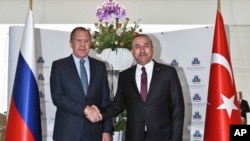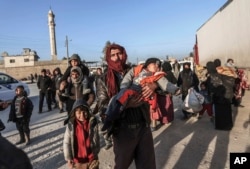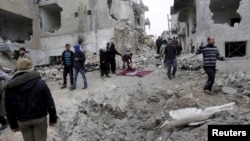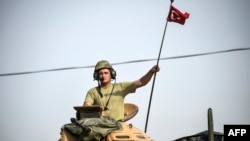The Russian and Turkish foreign ministers pledged Thursday to work together to resolve the ongoing humanitarian crisis in the Syrian city of Aleppo.
“We are in agreement that a cease-fire is needed so that the tragedy can come to an end,” declared Turkish Foreign Minister Mevlut Cavusoglu after meeting with Russian counterpart Sergei Lavrov.
The two ministers met at the Turkish Mediterranean resort of Alanya in the latest step toward a rapprochement. Relations collapsed in November 2015, when Turkish jets shot down a Russian bomber operating from Syria. Moscow retaliated with tough economic and trade sanctions.
The rapprochement initiated by Turkish President Recep Tayyip Erdogan has borne fruit, with both sides committed to restoring relations.
The issue of Syria, however, again threatens to derail those efforts. Erdogan's threat this week to remove Syrian President Bashar al-Assad militarily saw Moscow call for an urgent clarification. The Russian and Turkish presidents spoke by phone three times this week. Erdogan walked back his comments Thursday, saying Ankara’s priority is to defeat both the YPG, the Syrian Kurdish rebel group, and Islamic State.
Erdogan’s chief of international relations, Ayse Sozen Usluer, acknowledged differences over Syria, but said common ground can be found.
“The commonality to protect the territorial integrity of Syria and providing humanitarian aid, for instance for the people of Aleppo, we can negotiate on these issues," Usluer said. "But, on the other hand, Russia insists to protect Assad. ... So this is some kind of convergence and divergence between Russia and Turkey."
Moscow is widely suspected of involvement in an airstrike last week that killed four Turkish soldiers fighting in Syria as part of the ongoing military operation against the YPG and Islamic State.
“The date of the latest attack against the Turkish forces, it was very telling,” said political columnist Semih Idiz of the Al-Monitor website. “It was the same date to the day that Turkey downed a Russian plane. So many people believe there was some kind of Russian involvement.”
Russian Foreign Minister Lavrov, speaking in Alanya, denied that either Russian or Syrian forces was involved in the airstrike. Observers say Ankara appears ready to move on, focusing instead on areas of cooperation.
"It was the very telling that the [Turkish] government was very low key on the airstrike. Prime Minister [Binali] Yildirim has said that Turkey will retaliate and left it at that; he didn't pursue the matter," said Idiz.
According to media reports, both sides are cooperating to end the fighting in Aleppo, with Ankara using its contacts with and influence over Syrian rebels. Analysts suggest Ankara may have brokered a similar deal ahead of its incursion into Syria, which started with the capture of the Syrian border town of Jarabulus.
“Right after the taking over of Jarabulus in 14 hours, Deriya, near Damascus, which was a stronghold of the rebellion for more than four years, changed hands,” said retired senior Turkish diplomat Aydin Selcen, who served widely in the region.
“This leads some to think that there was some agreement or understanding between the Syrian regime and Ankara: if you enter Jarabulus; the rebellion has to leave Deriya.”
With Turkey remaining one of the main backers of the Syrian rebels and their main supply route, analysts say it retains influence over the rebels. Despite such influence, Ankara’s relations with Moscow are widely viewed as unequal.
“Turkey is on the weaker side of the equation at the moment because of very bad ties with the West,” said columnist Idiz. “Both Erdogan and the government and their supporters like to present Russia as [Turkey's] counterbalance to the West. So it’s really Turkey [that is] in the weaker situation here and Moscow knows this.”
Russia’s political leadership is using increasingly warm words to describe its relations with Turkey, a move analysts say is likely at least partly aimed at unnerving Ankara's NATO allies. Erdogan has also stepped up his rhetoric against Turkey's traditional Western allies, raising more and more questions about Turkey’s direction.
That is a mistake, said Erdogan adviser Ayse Sozen Usluer: “I don't see any possibility that Turkey will give up its relations with the U.S., or with the West.”
Critics of Ankara’s rapprochement with Moscow are quick to point out that many Russian sanctions against Turkey remain in force. Cavusoglu said Thursday that both sides agreed to lift remaining sanctions, but Lavrov warned the process will take time, offering no timetable for their end.







